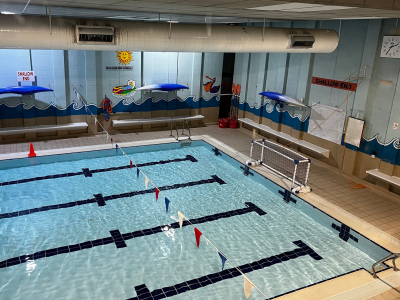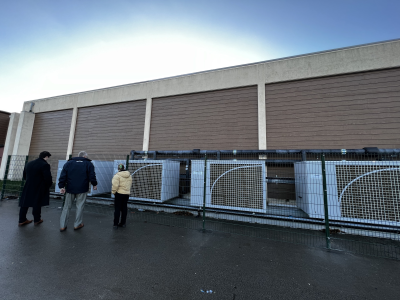The capital works
The trust was awarded £1,700,422 in funding through the scheme, which enabled the quick acceleration of the decarbonisation plans for its estate. This funding enabled upgrades at five of its sites: Lincoln Academy, LSST Academy, Ruskin Academy, Waddington Redwood Academy and Witham Academy.
Jim said: “This two-year project was the largest energy project ever attempted by the trust.”
The works saw the replacement of eight fossil fuel boilers with 12 air source heat pumps, plus accompanying energy efficiency measures. Additional solar was also installed to supplement the increased electrical demand, together with two batteries associated with the move away from gas to electricity-run technologies.
Lincoln Academy is a secondary school with more than 950 students aged from 11-18. Works here focused on the sports centre where the gas-fired boiler used to heat the water for a swimming pool was removed and replaced with five air source heat pumps.
Accompanying measures included the installation of variable speed drivers (which adjust motor speed in line with actual demand, rather than running at full speed all the time), a building management system, heat recovery and a solar array.
Additional solar was also installed at the Keyworth Centre, which hosts Lincolnshire School-Centred Initial Teacher Training (SCITT), Priory Apprenticeships and the trust’s professional development team.
LSST Academy is a secondary school which has more than 1,700 students aged from 11 to 18. The works at this site focused on the replacement of fossil fuel boilers in favour of two air source heat pumps.
Energy efficiency measures included a building management system, heat recovery systems and both a solar array and associated battery storage.
Ruskin Academy is a secondary school with 1,400 pupils aged from to 18. The works at this site focused on the replacement of ageing boilers in favour of two air source heat pumps, a building management system, heat recovery and solar PV.
Waddington Redwood Academy is a primary school with 300 pupils aged from four to 11. Works at this site focused on the removal of a gas boiler which was replaced with a single air source heat pump. Accompanying works included a building management system, ceiling insulation, variable speed drivers, heat recovery and solar PV.
Witham Academy is a large, all-through school with more than 1,000 students on roll aged from two through to 18. Works at this site removed both fossil fuel boilers in favour of two air source heat pumps, introduced building management systems, variable speed drivers, heat recovery and solar PV.
Looking ahead
An important part of the transition to these new, low-carbon technologies is the assessment and reflection to ensure they are functioning as intended. So, too, is the training of staff to equip them with the knowledge and experience to troubleshoot any issues that may come up.
Having overcome a few teething issues, the trust remains committed to continuing to implement its heat decarbonisation plan and to supporting its staff through the transition away from familiar, dated equipment like boilers.
Jim said: “This is a new technology for the trust, so it has been a learning curve, but we are supported by excellent contractors – mostly local – together with a comprehensive warranty package.”
With more work to do across their 13-academy estate, the trust is closely monitoring the data and outcomes from projects delivered so far to ensure the correct prioritisation is given to future works.
Jim said: “The combined data will help to define our future thinking and action to ensure we put money into the right areas, ensuring maximum value for the public money we are spending – from wherever the source.”
Ned Jordan, programme coordinator at Salix, said: “I am very excited to see what the trust achieves next!”
To read more about the positive outcomes that the project has had for staff and students, read our news story.





